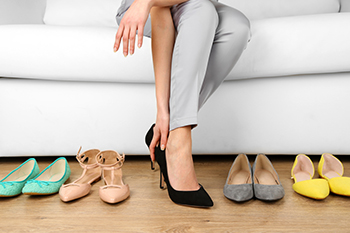
Wearing high heels can lead to a variety of discomforts and health issues. Continuous friction and pressure from ill-fitting shoes can cause blisters, corns, and calluses. Moreover, the unnatural foot position in high heels can contribute to ankle sprains, stress fractures in the foot or ankle bones, and even long-term problems like arthritis. The altered posture and gait induced by high heels can lead to pain in the knees, hips, and lower back. Additionally, the pressure on the toes can result in deformities like hammertoes or ingrown toenails. A podiatrist can provide valuable assistance in managing these issues. They can offer advice on proper footwear selection and fitting, as well as prescribe custom-made orthotic inserts to alleviate pressure points and improve foot mechanics. Podiatrists can also treat existing foot problems such as blisters, corns, and ingrown toenails, and provide guidance on stretching and strengthening exercises to mitigate the impact of high heels on foot health. If you wear high heels and are experiencing foot pain or any other foot problems, it is suggested that you make an appointment with a podiatrist for care.
High heels have a history of causing foot and ankle problems. If you have any concerns about your feet or ankles, contact Kenneth Williams, DPM from Texas. Our doctor can provide the care you need to keep you pain-free and on your feet.
Effects of High Heels on the Feet
High heels are popular shoes among women because of their many styles and societal appeal. Despite this, high heels can still cause many health problems if worn too frequently.
Which Parts of My Body Will Be Affected by High Heels?
- Ankle Joints
- Achilles Tendon – May shorten and stiffen with prolonged wear
- Balls of the Feet
- Knees – Heels cause the knees to bend constantly, creating stress on them
- Back – They decrease the spine’s ability to absorb shock, which may lead to back pain. The vertebrae of the lower back may compress.
What Kinds of Foot Problems Can Develop from Wearing High Heels?
- Corns
- Calluses
- Hammertoe
- Bunions
- Morton’s Neuroma
- Plantar Fasciitis
How Can I Still Wear High Heels and Maintain Foot Health?
If you want to wear high heeled shoes, make sure that you are not wearing them every day, as this will help prevent long term physical problems. Try wearing thicker heels as opposed to stilettos to distribute weight more evenly across the feet. Always make sure you are wearing the proper shoes for the right occasion, such as sneakers for exercising. If you walk to work, try carrying your heels with you and changing into them once you arrive at work. Adding inserts to your heels can help cushion your feet and absorb shock. Full foot inserts or metatarsal pads are available.
If you have any questions please feel free to contact our office located in San Antonio and Beeville, TX . We offer the newest diagnostic and treatment technologies for all your foot and ankle needs.
